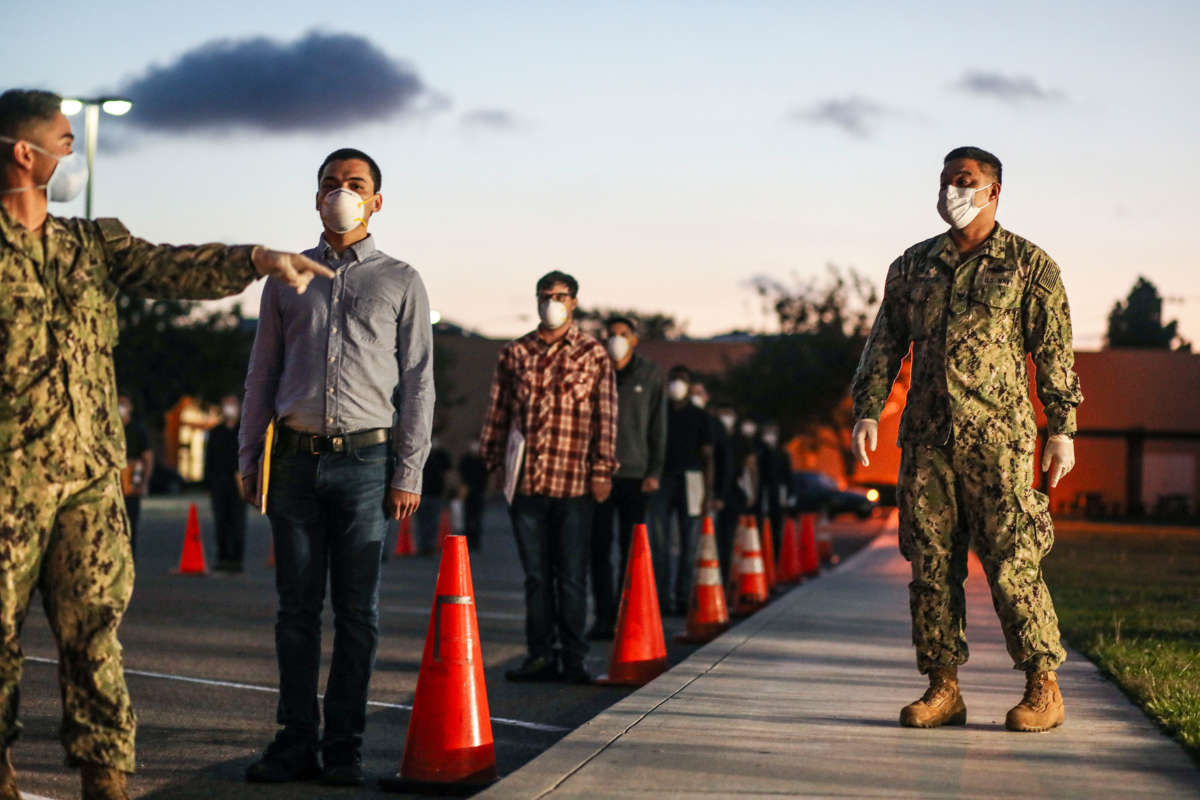A leaked memo from the Pentagon suggests the Department of Defense does not hold the same optimistic tone that President Donald Trump does when it comes to how fast a vaccine for coronavirus could be developed.
The document, which is not the official view of the Pentagon, warns of a “globally-persistent” coronavirus environment in the U.S. for some time to come, and states that a vaccine likely won’t be available to the public until “at least the summer of 2021.”
“We have a long path ahead, with the real possibility of a resurgence of COVID-19,” the memo states. “Therefore, we must now re-focus our attention on resuming critical missions, increasing levels of activity, and making necessary preparations should a significant resurgence of COVID-19 occur later this year.”
The memo was written by Kenneth Rapuano, assistant secretary of defense for homeland defense and global security, according to reporting from Task & Purpose, which first reported on the document’s existence. While Rapuano was the initial author, the memo was written out as if to be authored by Defense Secretary Mark Esper.
It’s unclear if Esper has seen the document or not, or weighed in on its contents. A spokeswoman at the Pentagon said the document was outdated, but wouldn’t say when it was specifically authored. The memo is meant to update previous guidance issued by the Pentagon on April 1, and was reportedly circulated among military services around the beginning of May.
The memo’s contents are a bleaker assessment of what the president has suggested might happen, especially with regard to the development of a coronavirus vaccine.
Last week Thursday, Trump tweeted that “vaccine work is looking VERY promising,” and that a vaccine for the disease could be available “before [the] end [of the] year.”
On Friday, reporters at the White House were informed about “Operation Warp Speed,” an ambitious plan to “manufacture and distribute a proven coronavirus vaccine as fast as possible,” according to the president.
“I want to see if we can do that very quickly. When I say ‘quickly,’ we’re looking to get it by the end of the year if we can,” Trump said about the program. “Maybe before.”
Moncef Slaoui, a former pharmaceutical executive at Moderna, the company that’s working in conjunction with the government in developing a COVID-19 vaccine, was named by the president to lead Operation Warp Speed. In his own comments about the vaccine’s development, he gave an assessment that was more in line with the Pentagon’s leaked memo than Trump’s rosy outlook.
“Frankly, 12 to 18 months is already a very aggressive timeline,” Slaoui said.
Slaoui himself was embroiled in a bit of controversy on Monday, after it was announced that the vaccine from Moderna had performed well in initial small-sample trials. Stocks in Moderna responded positively from the news — and Slaoui appeared to benefit financially as a result.
On Friday, when trading on Wall Street closed for the weekend, the stock price for Moderna was around $66 per share. On Monday at noon, the price jumped up to around $84 per share on news of the vaccine’s initial successes.
Slaoui still had millions of dollars in shares from Moderna even after he left the company to join the White House’s efforts on Operation Warp Speed. In response to criticisms over him profiting from being on the project, the former Moderna executive announced he was selling off his shares, and donating the gains he made from the time the news was announced to his divestment, to cancer research.
Tal Zaks, Moderna’s chief medical officer, expressed optimism that a vaccine from the company could be made available by January. But again, experts have cautioned against such thinking.
“In the best of circumstances, we should have a vaccine — or let’s say vaccines — between 12 and 18 months,” Stanley Plotkin, the individual credited with creating the rubella vaccine in the 1960s, told NBC News. “Whether those circumstances will be the best or not, we don’t know.”
Even if a vaccine is produced by the end of the year, it’s unclear that many Americans would be able to access it, as the White House has not made any guarantees on whether there would be universal access to the coronavirus vaccine.
Thank you for reading Truthout. Before you leave, we must appeal for your support.
Truthout is unlike most news publications; we’re nonprofit, independent, and free of corporate funding. Because of this, we can publish the boldly honest journalism you see from us – stories about and by grassroots activists, reports from the frontlines of social movements, and unapologetic critiques of the systemic forces that shape all of our lives.
Monied interests prevent other publications from confronting the worst injustices in our world. But Truthout remains a haven for transformative journalism in pursuit of justice.
We simply cannot do this without support from our readers. At this time, we’re appealing to add 50 monthly donors in the next 2 days. If you can, please make a tax-deductible one-time or monthly gift today.
